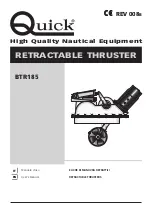
Appendix B: BIOS POST Codes
B-5
POST Code Description
D2h
Unknown interrupt
D4h
Check Intel Branding string
D8h
Alert Standard Format initialization
D9h
Late init for IPMI
DEh
Log error if micro-code not updated properly
The following are for boot block in Flash ROM
POST Code Description
E0h
Initialize the chipset
E1h
Initialize the bridge
E2h
Initialize the CPU
E3h
Initialize system timer
E4h
Initialize system I/O
E5h
Check force recovery boot
E6h
Checksum BIOS ROM
E7h
Go to BIOS
E8h
Set Huge Segment
E9h
Initialize Multi Processor
EAh
Initialize OEM special code
EBh
Initialize PIC and DMA
ECh
Initialize Memory type
EDh
Initialize Memory size
EEh
Shadow Boot Block
EFh
System memory test
F0h
Initialize interrupt vectors
F1h
Initialize Run Time Clock
F2h
Initialize video
F3h
Initialize System Management Manager
F4h
Output one beep
F5h
Clear Huge Segment
F6h
Boot to Mini DOS
F7h
Boot to Full DOS
*If the BIOS detects errors on 2C, 2E, or 30 (base 512K RAM errors), it displays an
additional word-bitmap (
xxxx
) to indicate the address line or bits that have failed. For
example, “2C 0002” means address line 1 (bit one set) has failed. “2E 1020" means
data bits 12 and 5 (bits 12 and 5 set) have failed in the lower 16 bits. The BIOS also
sends the bitmap to the port-80 LED display. It fi rst displays the checkpoint code,
followed by a delay, the high-order byte, another delay, and then the loworder byte
of the error. It repeats this sequence continuously.
Summary of Contents for x7dwa-N
Page 1: ...X7DWA N USER S MANUAL Revision 1 0 SUPER...
Page 20: ...1 14 X7DWA N User s Manual Notes...
Page 56: ...2 36 X7DWA N User s Manual Notes...
Page 92: ...A 6 X7DWA N User s Manual Notes...
Page 98: ...B 6 X7DWA N User s Manual Notes...
Page 132: ...E 4 X7DWA N User s Manual Notes...
















































